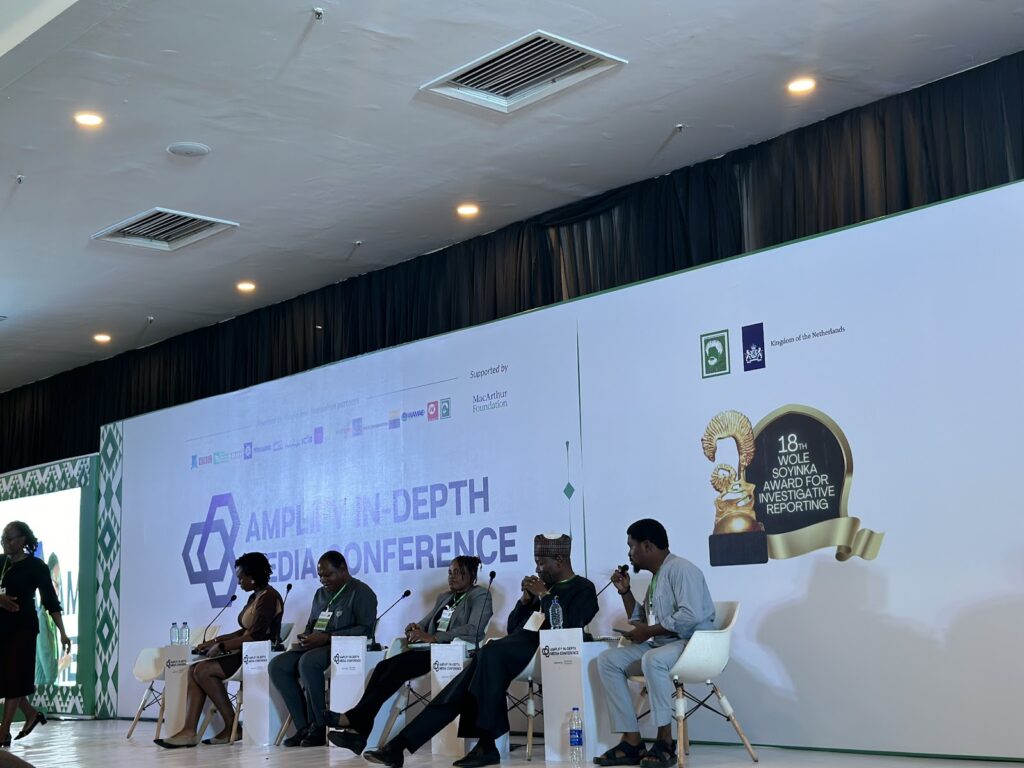The Amplify In-depth Media Conference commenced today in Abuja, Nigeria’s capital city, co-hosted by the Wole Soyinka Centre and 19 other media organisations.
The conference is a product of the ‘On Nigeria Project’ Media and Journalism (MAJ) cohort of the MacArthur Foundation, which includes HumAngle Media and 19 other organisations.
In her goodwill message, Amina Salihu, the Deputy Director (Ag.) of the Africa office of the MacArthur Foundation, appreciated the WSCIJ and the other 19 partners, as well as the 45 sub-grantees of the MacArthur Foundation who are working to deliver information people deserve to have access to.
She said, “This conference is important as it is important to take the wellness and well-being of the media seriously so as to achieve effective policy change.”
She also highlighted that it is not the sole duty of journalists to investigate and report and then do the convincing, noting that it is important for civil society organisations to take up the findings of the investigations done by journalists and ensure positive change through advocacy.
Dapo Olorunyomi, Founder and CEO of the Centre for Journalism Innovation and Development (CJID), delivered the keynote address which was titled ‘The Independent Media equation: Policies, Technology and Sustainability.’
The first panel discussion of the day was moderated by Kimberly Nwachukwu of Nigeria Info Fm and consisted of panellists Yemisi Bamgbose of Broadcast Organization Of Nigeria; Chioma Agwegbu, the Executive Director of TechHerNG; Nazir Abubakar, Editor-In-Chief of Daily Trust. They discussed media ownership, sustainability, and emerging technologies in journalism.
Nazir highlighted the need fo journalists to use intellectual property copyrights to protect their content and publication and also the economic value of the ownership.
The conference featured several more panels and workshops, including a workshop facilitated by Motunrayo Alaka, Executive Director/CEO of WSCIJ, where she took participants through the process of writing pitches for investigative story ideas. She emphasised the need for journalists to report factually and with strong evidence while highlighting important steps to take during the pitching process.
HumAngle’s Investigations Editor, Kunle Adebajo, also moderated a panel session on Media Independence Sustainability, where he led conversations on business models and collaboration as a tool towards sustainability. Panellists like Theophilus Abbah, Director of Daily Trust Foundation, highlighted that it was important for news to go beyond the surface, as the quality of the news being shared is another factor that can help ensure that the media remains sustainable.

“Media houses have to focus on in-depth analysis of news and highlight the implications and effects of the events unfolding,” Abbah said.
On the same panel, Chinedu Anumudu, a lecturer at Baze University spoke on the need to train students to also consider the business aspect of journalism. “We need to match media education with marketing skills in mixing traditional and new media to reach the target audience and integration of media entrepreneurship,” she said.
Day one of the conference ended with a session on ethical considerations in journalism, where journalists from The Nation, Punch, and Daily Trust, discussed ethical ways of using tools such as AI while reporting.
The programme is expected to come to an end tomorrow, Dec. 9th.
Support Our Journalism
There are millions of ordinary people affected by conflict in Africa whose stories are missing in the mainstream media. HumAngle is determined to tell those challenging and under-reported stories, hoping that the people impacted by these conflicts will find the safety and security they deserve.
To ensure that we continue to provide public service coverage, we have a small favour to ask you. We want you to be part of our journalistic endeavour by contributing a token to us.
Your donation will further promote a robust, free, and independent media.

